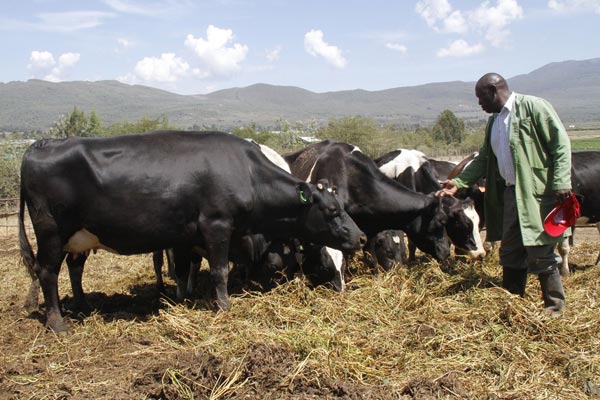Dairy farmers in Kenya are positioning themselves to benefit from the commercialisation of embryo transfer, a breeding technology being introduced by two firms in central and Rift Valley areas.
The technology involves harvesting and implanting a developed embryo into a surrogate cow.
Gakindu Dairy Co-operative Society in Mukurwe-ini sub-county of Nyeri and Makongi farm in Uasin Gishu County are piloting the technology which they say would considerably reduce costs of high quality dairy heifers.
Ephantus Gichohi, Gakindu Dairy Co-operative Society chairman, says they bought the idea from the East African Semen and Embryo Transfer Association and organised for farmers’ sensitisation programme in partnership with Agricultural Sector Development Support Programme.
He says with proper uptake of the technology by farmers, the society projects to increase its milk collection from current five to 30 litres per cow every day.
Tim Chesire says Makongi firm has entered into a partnership with Invitro Brasil, one of the largest embryo companies in the world, to set up the first laboratory to offer farmers cheaper breeding options. The firm has built a laboratory which has a capacity to produce more than 20,000 embryos annually with a projected success rate of 45 per cent.
“With this new technology, farmers will get quality heifers and embryos at reasonable prices,” he says.
The technology entails removal of female eggs (oocytes) from a cow and transferring to a laboratory where it is fertilised with semen imported from Europe (Scandinavian countries or France) before it is placed into an incubator.
“The oocytes are extracted from the animal through the use of an improvised plastic tube and stored in a cool box before it is transferred to the lab,” says Chesire.
“In the incubator, our vets will control the temperatures as they wait for the cells to split, an indication that fertilisation has taken root. After seven days, the embryo is then placed unto a surrogate.” Ruth Kogos, an embryologist at Makongi laboratory, said the process of improving breeds through In Vitro Fertilization (IVF) locally will cut costs for farmers who have been importing pedigree animals from South Africa.
“Before we remove the oocytes from the cow, our team has to conduct an extensive research and protocol on the animal to ascertain the vaccination record and its reproductive status to ensure the final breed is of good quality,” she said.
Kogos explained that the transfer process has the capability of determining the ideal sex for the unborn calf, an advantage IVF has over Artificial Insemination (AI). Through the use of ultra sound, the farmer will know the sex of the calf 80 days after the oocytes have been transferred.
Chesire says Borana cows are ideal as surrogates because of their capacity to easily calf. “The good thing about IVF is that the surrogate does not transfer its genes to the unborn because they are just used to carry the foetus,” he explained.
He said dairy breeds developed through IVF can produce more than 40 litres of milk daily. “For the entire process, we only charge Sh50, 000. Importing pedigree animals from South Africa costs Sh250, 000,” he said.
Farmers in the region have welcomed the initiative, saying it will help them improve on their breeds. Stephen Sorobit, a farmer from Cheptiret, asked the Uasin Gishu County Government to support the initiative by subsidising the costs of the process for interested farmers.
“We have suffered for long. This is an opportunity for us to improve our dairy breeds so we can reap more from farming,” he said. Sorobit challenged the Agriculture ministry to rationalise milk prices in the market so that farmers can benefit from their sweat.

